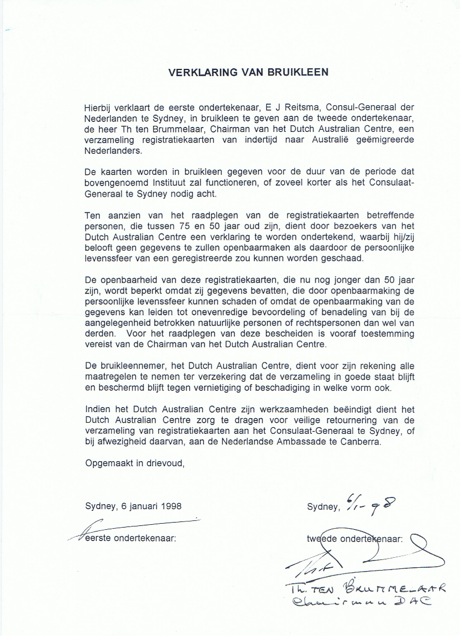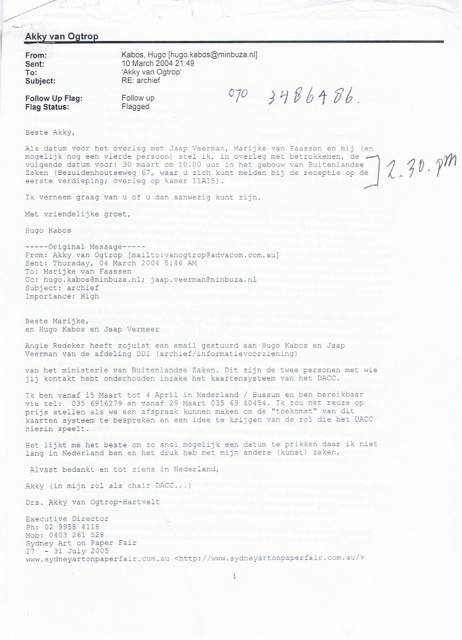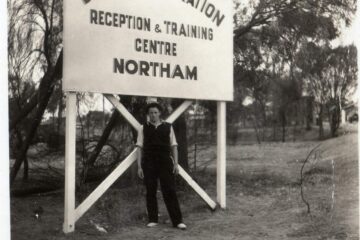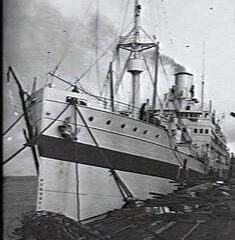The preservation and digitalisation of Dutch- Australian Migrant Registration Cards
Over the decades, the Netherlands Embassy and Consulates in Australia maintained a card system documenting migrants from the Netherlands. The system contains over 55,000 cards, representing 80-90% of Dutch people who emigrated to Australia between 1946-1991.
In 1998, The Consul-General Sydney in accordance with the ‘Verklaring van Bruikleen’ (see below), transferred the card system to the DACC.
In 2003 the Dutch Ministry of Foreign Affairs then initiated a process to ensure the preservation of the card system in collaboration with the DACC. The Director of DDI (Documentary Information Service) at the Ministry Jaap Veerman, asked Marijke van Faasen, researcher at the Institute for the History of the Netherlands (ING, now Huygens Institute) to assess the collection for its historical value and put her in contact with the then Consul General Sydney, Madelien de Planque.
Meanwhile, Akky van Ogtrop, Chair of the DACC at the time was concerned about the archives and sought advice from Alan Tasker, a Field Librarian from the State Library of NSW, regarding the Migrant Registration Cards. The primary concern was compliance with privacy His advice was to get in touch with the then Dutch Consul General Madelien de Planque. and the DACC immediately informed her about their concerns about sensitive information contained within the cards. The DACC ‘locked’ the archives and Angie Redeker followed up with us..and together with the DACC initiated a process to ensure the preservation of the card system.
Both Tasker and Van Faassen recognised the collection’s significance as part of Dutch Cultural Heritage and recommended Foreign Affairs to get in contact with the National Archives in the Hague.
This led to collaboration between Foreign Affairs and representatives from the National Archives in the Netherlands (Nationaal Archief). In 2004, Akky travelled to The Hague and met with Jaap Veerman, Marijke van Faassen, along with representatives from the National Archives.
Following discussions with the National Archives expressing interest in the collection, Foreign Affairs in collaboration with the Consul General, Madelien de Planque and DACC planned to oversee the transfer of the archives to The Hague. By the end of 2004, the archive had left the DACC’s premises. At the time, it was stipulated by the DACC that information from these cards should be transferred into a database and made accessible to the general public. On Van Faassen’s advice first an index was made by Foreign Affairs in such a way that in time it would be possible to connect them digitally with the application files and other historical records of Dutch immigrants created by the Australian government and kept in the National Archives Australia.
The handover of the cards and the index to the National Archives took place on 30 March 2006 and formed part of the Dutch Australian -Conference Netherlands- Australia 1606-2006. The conference was organised by the National Archives the Hague in the Oude Zaal, House of Representatives in The Hague and the accompanying exhibition ‘ Inpakken Wegwezen’ was curated by Jacqueline van der Mark, advised by Dr. Nonja Peters and Marijke van Faassen. The cards were handed over during the launch of the exhibition in the Statenpassage by Speaker of the House Frans Weisglas and Stephen Brady, Australians ambassador to the Netherlands at the time.
Following a pilot study (2010-2013) in which the registration cards were digitised by Huygens and the National Archives, Van Faassen, Hoekstra (Huygens/Digital Humanities Lab (KNAW)) and Van Kalmthout, developed the research project Migrant, Mobilities and Connection (2014) in collaboration with Nonja Peters and Paul Arthur (ECU Australia), The project received attention during a workshop in March 2015 which included a morning at DACC to promote the benefits of digitisation, in which Rik Hoekstra gave a presentation and during the global Digital Humanities Conference Sydney in June 2015 where Marijke van Faassen gave a paper on the registration cards on behalf of the project team. This led to the Nias Lorenz workshop 2016 and a follow up during the Sydney-Canberra workshop 2018. In 2018, project Migrant published a programmatic article and became a partner in the Dutch-Australian Shared Cultural Heritage Project. Together with the National Archives in both the Netherlands and Australia project Migrant is working on a proof of concept to show how migrant heritage can be digitally connected, using the registration cards as a structural device and how this provides a wider perspective on Dutch-Australian migration and its heritage.
While the involvement of the DACC has largely been lost, it is important to highlight its foresight to ensure its long-term preservation. Thanks to modern digital technologies the collection or part thereof can be made available again.
DACC CHAIRPERSON REPORT DACC AGM 20 November 2004
Another important project was finalised this year.
The Register of Migrant Registration Cards, part of “Nederlands Cultureel Erfgoed”.was officially accepted by The National Archives in the Hague and last month the collection was sent back to the Netherlands. The DACC received an official letter of thanks from the Consul General of the Netherlands: Madelien de Planque to comment about the way the DACC has looked after the collection for so many years and to thank all people involved in preserving this part of Nederlands Cultureel Erfgoed for future study and research.
The DACC in conjunction with the Dutch Embassy, the Consulate and Dutch Foreign Affairs are looking to officially celebrate the successful conclusion of this project in 2006, coinciding with the celebrations of Australia on the Map 1606 – 2006


Scroll down in the pdf below for examples of the Migration Cards


